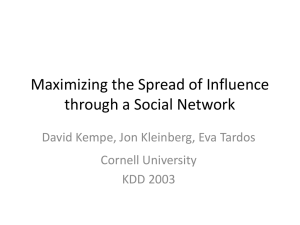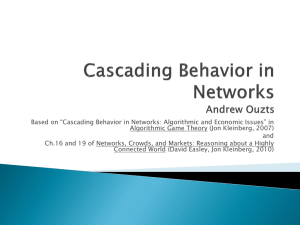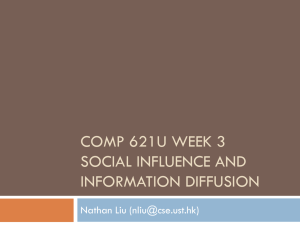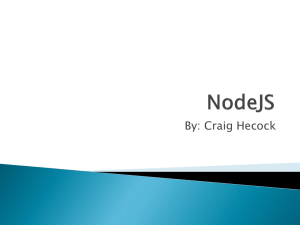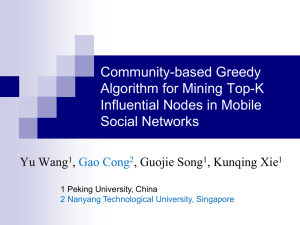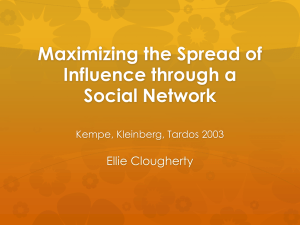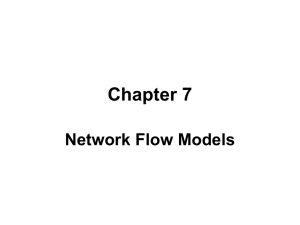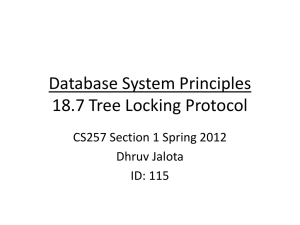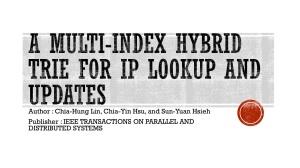Maximizing the Spread of Influence through a Social Network
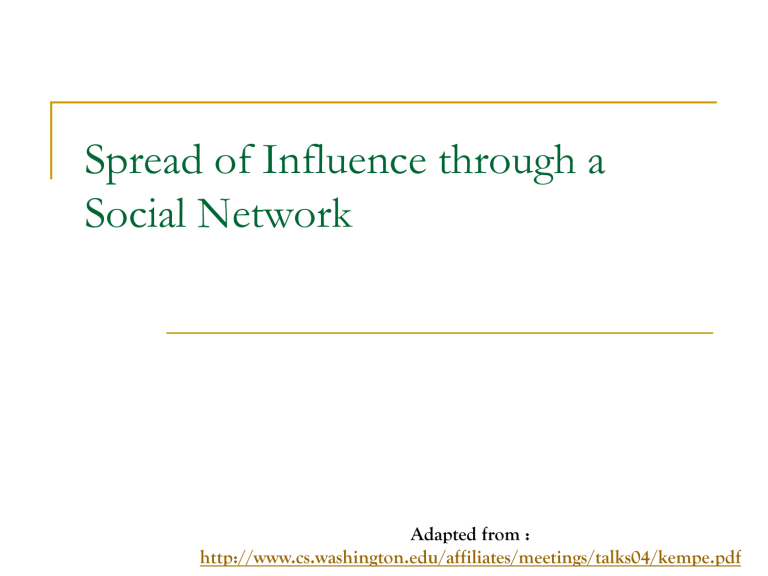
Spread of Influence through a
Social Network
Adapted from : http://www.cs.washington.edu/affiliates/meetings/talks04/kempe.pdf
Influence Spread
We live in communities and interact with our friends, family and even strangers.
In the process, we influence each other.
University of British Columbia
Social Network and Spread of Influence
Social network plays a fundamental role as a medium for the spread of
INFLUENCE among its members
Opinions, ideas, information, innovation…
Direct Marketing takes the “ word-ofmouth ” effects to significantly increase profits (Gmail, Tupperware popularization,
Microsoft Origami …)
Social Network and Spread of Influence
Examples:
Hotmail grew from zero users to 12 million users in 18 months on a small advertising budget.
A company selects a small number of customers and ask them to try a new product. The company wants to choose a small group with largest influence.
Obesity grows as fat people stay with fat people
(homofily relations)
Viral Marketing..
4
5
Viral Marketing
Identify influential customers
Convince them to adopt the product –
Offer discount/free samples
These customers endorse the product among their friends
Problem Setting
Given
a limited budget B for initial advertising (e.g. give away free samples of product) estimates for influence between individuals
Goal
trigger a large cascade of influence (e.g. further adoptions of a product)
Question
Which set of individuals should B target at?
Application besides product marketing
spread an innovation detect stories in blogs (gossips)
What we need
Form models of influence in social networks.
Obtain data about particular network (to estimate inter-personal influence).
Devise algorithm to maximize spread of influence.
Outline
Models of influence
Linear Threshold
Independent Cascade
Influence maximization problem
Algorithm
Outline
Models of influence
Linear Threshold
Independent Cascade
Influence maximization problem
Algorithm
Models of Influence
Two basic classes of diffusion models: threshold and cascade
General operational view:
A social network is represented as a directed graph, with each person (customer) as a node
Nodes start either active or inactive
An active node may trigger activation of neighboring nodes
Monotonicity assumption : active nodes never deactivate (not always true, e.g. epidemics, here more complex models are used)
Outline
Models of influence
Linear Threshold
Independent Cascade
Influence maximization problem
Algorithm
Linear Threshold Model
A node v has random threshold
θ v
~ U[0,1]
A node v is influenced by each neighbor w according to a weight b vw such that w
neighbor of v b
1
A node v becomes active when at least
(weighted)
θ v fraction of its neighbors are active w
active neighbor of v b
v
Similar to perceptron model..
Example
0.6
0.3
0.2
X
0.1
0.4
w
0.5
0.3
0.5
0.2
Inactive Node
Active Node
Threshold
Active neighbors
0.2
v
U
Stop!
Outline
Models of influence
Linear Threshold
Independent Cascade
Influence maximization problem
Algorithm
Independent Cascade Model
When node v becomes active, it has a single chance of activating each currently inactive neighbor w.
The activation attempt succeeds with probability p vw
.
Example
0.6
0.3
0.2
0.4
X
0.1
w
0.5
0.3
0.5
0.2
v
U
0.2
Stop!
Inactive Node
Active Node
Newly active node
Successful attempt
Unsuccessful attempt
Outline
Models of influence
Linear Threshold
Independent Cascade
Influence maximization problem
Algorithm
Influence Maximization Problem
Influence of node set S: f(S)
expected number of active nodes at the end, if set S is the initial active set
Problem:
Given a parameter k ( budget ), find a k -node set S to maximize f(S)
Constrained optimization problem with f(S) as the objective function
f(S): properties
(to be demonstrated)
Non-negative (obviously)
Monotone: (
( )
Submodular:
Let N be a finite set
A set function is submodular iff
"
S
Ì
T
Ì
N ,
" v
Î
N \ T , f ( S
+ v )
f ( S )
³ f ( T
+ v )
f ( T )
(diminishing returns)
Bad News
For a submodular function f , if f only takes nonnegative value, and is monotone, finding a k -element set S for which f(S) is maximized is an NP-hard optimization problem.
It is NP-hard to determine the optimum for influence maximization for both independent cascade model and linear threshold model.
Good News
We can use Greedy Algorithm!
Start with an empty set S
For k iterations:
Add node v to S that maximizes f(S +v) - f(S).
How good (bad) it is?
Theorem: The greedy algorithm is a (1 – 1/ e ) approximation.
The resulting set S activates at least (1- 1/ e ) > 63% of the number of nodes that any size-k set S could activate.
Estimating Spread S(v)
We observe that the influence of a node x on node z can be computed by enumerating all simple paths starting from x and ending in z.
A simple path is a path that doesn ’t contain any cycle x
0.1
0.3
0.4
y
0.2
0.5
z
Total influence of x on z is 0.46
y z is
0.3 * 0.2 = 0.06
University of British Columbia
22
Estimating Spread
Thus, the spread of a node can be computed by enumerating simple paths starting from the node. x
0.1
0.3
0.4
y
0.2
0.5
z node x is 1.96
Influence Spread of node x is
= 1 + (0.3 + 0.4 * 0.5) + (0.4 + 0.3 * 0.2) = 1.96
University of British Columbia
23
Estimating Spread
x
0.1
0.3
0.4
y
0.2
0.5
z
Let the seed set S = {x,y}, then influence spread of S is
( S )
V
y
( x )
V
x
( y )
1
0 .
4
1
0 .
2
2 .
6
24
University of British Columbia
Performance
Spread of influence algorithms have been demonstrated to obtain much better performance wrt simpler methods such as:
Page Rank
– Top-k nodes with highest page rank.
High Degree
– Top-k nodes with highest degree.
Temporal complexity is an issue (several algorithms recently improved over “base” algorithm described here)
